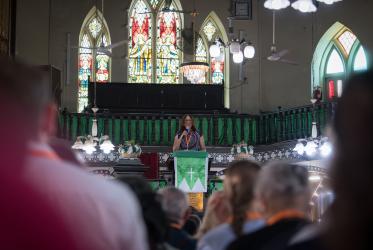Christian theologians, historians and ecumenical activists take stock of the current state of ecumenism and the future of the movement for Christian unity in the newest issue of Ecumenical Review.
Entitled Ecumenical Horizons: Prospects and Perspectives, the issue is dedicated to assessing the stresses on the ecumenical movement in an age of globalization, economic crisis and rapidly changing religious demographics.
After a century of growth and accomplishment, asks the Rev. Dr Ellen Ueberschär in this issue, is it true “that the ecumenical movement has a glowing past and a gloomy future”?
Ueberschär and other contributors from several continents and Christian communions sketch the altered ecumenical landscape, including cultural vectors that prize divergence and diversity over convergence and unity, the stronger presence of Pentecostal and evangelical churches, and the internal focus among financially strapped churches in Europe and North America.
The specific role of the World Council of Churches within the larger ecumenical scene is especially debated, in contributions from former staffers Rev. Dr Simon Oxley and Rev. Jacques Matthey and the most recent reports of WCC general secretary Rev. Dr Olav Fykse Tveit and WCC moderator Rev. Dr Walter Altmann.
WCC’s Faith & Order director Rev. Dr John Gibaut, Asian theologian Rev. Ambrose Mong Ih-Ren, and Orthodox theologian Rev. Prof. Nicu Dumitrascu offer promising theological frameworks for ecumenical renewal, including enhanced appreciation for catholicity, newer conceptions of mission that are truly affirming of all peoples and cultures, and deeper understanding of the openness in classical Christian sources to the physical sciences and philosophy.
Ecumenical Review is the quarterly journal published by the World Council of Churches in partnership with Wiley-Blackwell, Oxford. The current issue, as well subscriber information and excerpts of prior issues, can be seen at http://onlinelibrary.wiley.com/doi/10.1111/erev.2011.63.issue-2/issuetoc.







